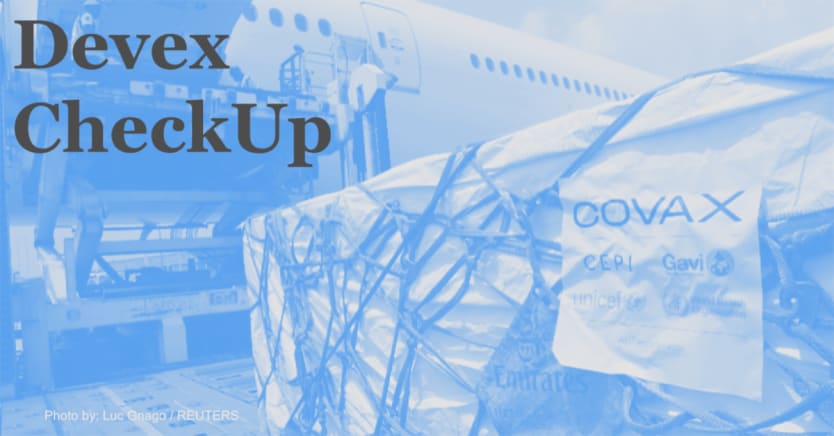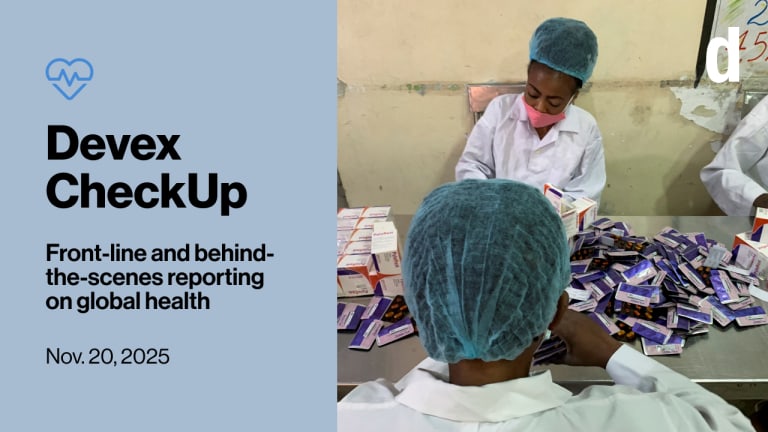Presented by Data.org

After months of campaigning, the Global Fund’s seventh replenishment conference is finally happening on Sept. 21. But at this point, it still isn’t clear whether it will be able to meet its fundraising target of $18 billion.
• Global Fund supporters expect more pledges to take place on the day of the conference. But as of this week, publicly announced funding pledges have only reached roughly $8.8 billion — less than half the target. The United States, which has been the fund’s largest donor, has pledged $6 billion. Germany and Japan have pledged $1.3 billion and $1.08 billion, respectively, in recent weeks. But others such as France and the United Kingdom, which rank second and third among the fund’s government donors, have not yet made any announcements.
• The BIG question:
• Fundraising is already tough given the current global financial environment, with the economic impacts of the COVID-19 pandemic and the Russian invasion of Ukraine.
• But even if the Global Fund successfully reaches its funding goal next week, this won’t be enough to support all critical programs tackling HIV, tuberculosis, and malaria. The overall resources needed for the three diseases total $130.2 billion. Of that amount, $18 billion is expected to come from the Global Fund, $25.2 billion from other external funding sources, and $58.6 billion from domestic funding. That leaves a gap of $28.4 billion — and it’s unclear where it will come from.
• Failure to raise enough money could reverse progress against the three diseases — a turnaround that Médecins Sans Frontières warns is already underway in several countries. In its clinics in Kachin and Shan states in Myanmar, MSF reported seeing an increase from 54.8% to 82.3% in the number of patients presenting with advanced HIV disease. In other countries, limited funding already means Global Fund grants are unable to cover certain interventions, such as voluntary HIV counseling and testing services in the Central African Republic.
Global Fund replenishment: Pledges, expectations, and what's at stake
UNGA management
This is a preview of Devex CheckUp
Sign up to this newsletter for exclusive global health news and insider insights, in your inbox every Thursday.
At the annual U.N. General Assembly — which started on Monday and has its high-level week next week — one of the important questions our colleagues attending the event want to know is: Will competing priorities overshadow global health funding needs? Devex Senior Reporter Michael Igoe writes that the aid community will get a barometer on that with the Global Fund’s replenishment conference.
Devex will also be hosting a series of conversations on Sept. 21 on all things health. High-profile speakers include Loyce Pace, Atul Gawande, Winnie Byanyima, and Ashley Judd.
Watch the livestream of the full event. Register now to save your spot.
Learn more: The global development issues we're watching at UNGA 77 (Pro)
+ A Devex Pro membership brings you essential analysis, data-driven funding insights, and access to the world’s largest global development job board. Get these perks and more by signing up to our 15-day free trial.
The doctor (will soon be) out
Dr. Anthony Fauci has advised seven U.S. presidents, played a significant role in tackling the HIV and AIDS crisis in the U.S., and has become a celebrity of sorts in the country, while providing national guidance on COVID-19 and dealing with a president who discredited him and made false claims over unproven COVID-19 treatments.
But the impact of Fauci’s work extends beyond the U.S., and colleagues say many are alive today because of “Tony.”
As Fauci prepares to step down from his government positions in December, we look back at some of his global health work, told to Jenny by long-time colleagues, global health leaders, and Fauci himself.
Beyond the US: Dr. Anthony Fauci's global health contributions
Deal or no deal?
In June, WTO members agreed to temporarily waive patents on COVID-19 vaccines. On Monday, they are meeting again to discuss their positions on a possible extension of that agreement to cover COVID-19 diagnostics and therapeutics. But Devex contributor Andrew Green writes that access advocates fear that may not happen.
Your next job?
PEPFAR Coordinators
Global Health Technical Assistance and Mission Support Project (GH-TAMS)
Worldwide
• WTO members agreed in June to decide on whether to ease access to COVID-19 tests and treatments by December. But the proposal faces ongoing opposition from the U.K., Switzerland, and members of the European Union, among others — the same governments that opposed a broad waiver proposal that included COVID-19 vaccines because they don’t think it would result in additional vaccine doses and instead may only undermine pharmaceutical innovations in the future. And it’s unclear if the U.S. will join the more than 100 countries that support it.
• The language of the deal in June could be used by those in opposition to skirt an extension, arguing there is no mandate to actually expand the agreement. According to the decision text, “No later than six months from the date of this Decision, Members will decide on its extension to cover the production and supply of COVID-19 diagnostics and therapeutics.”
Read: Little progress on COVID drugs agreement at WTO, civil society warns
What we’re reading
WHO launched a $1.5 billion campaign and hopes to roll out a new vaccine in 2023 to eliminate outbreaks of bacterial meningitis across Africa. [Associated Press]
A pandemic preparedness fund housed at the World Bank has launched with $1.4 billion in pledges. [Devex]
WHO, Gates Foundation, and FIND pulled out of a TB conference in South Africa after learning the conference’s main sponsor accepted tobacco industry money. [Bhekisisa]










